Louis van Gaal: New Man Utd manager's biggest bust-ups
- Published
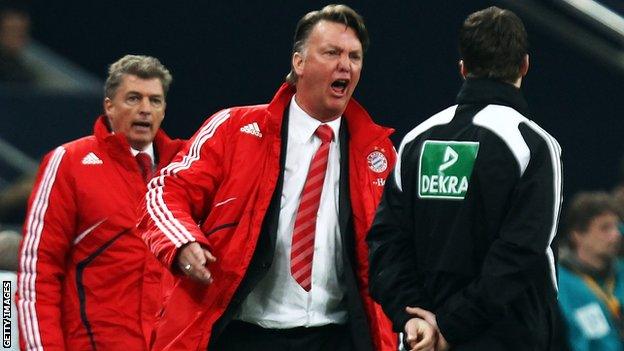
"I soon realised he was an amazing professional - he was the ultimate pro", says Louis van Gaal of Robin van Persie
New Manchester United manager Louis van Gaal has never been afraid to have an argument or make it clear who is in charge.
From star players to influential club legends, the 62-year-old Dutchman has made a few enemies during his 42 years in football, the past 23 of those coaching some of Europe's leading clubs and the Netherlands national team whom he led to third place at the 2014 World Cup in Brazil.
Van Gaal's major titles |
|---|
Domestic leagues: Ajax (1993-94, 1994-95, 1995-96), Barcelona (1997-98, 1998-99), AZ Alkmaar (2008-09), Bayern Munich (2009-10) |
Champions League: Ajax (1994-95) |
Uefa Cup: Ajax (1991-92) |
During his first news conference at Old Trafford, Van Gaal insisted he was more "democrat" than autocrat, extolling his "strong personality" - a trait, he reminded his audience, he shares with former United boss Sir Alex Ferguson.
But why does Van Gaal come to English football with such a fearsome reputation? BBC Sport gets the inside story on his biggest bust-ups.
Falling out with his manager
The time he was told he was too slow
Louis van Gaal never lacked confidence and his strong personality was there, even as a player. He made his name as a midfielder with the Royal FC Antwerp, under Guy Thys, the legendary Belgian coach.
"I was annoyed that he did not always play me," Van Gaal later recalled. "I was one of four foreigners and he could only play three in those days. Thys reckoned I lacked pace.''
Thys said: "He'd come up to me and ask me why I did not play him. 'Boss, I am the best player, aren't I?' And then I would tell him he was not. He could not believe that.
"I do admit he had by far the strongest personality of all the players I have come across. But, sorry to say, he was slow… "
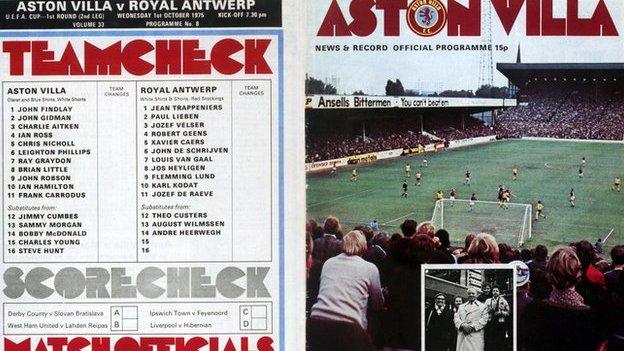
Van Gaal is listed in the Aston Villa match programme for Royal Antwerp's visit in the 1975 Uefa Cup
One of Van Gaal's best performances came in a 4-1 victory over Aston Villa in the home leg of the Uefa Cup tie in 1975. "That day against Villa he was absolutely brilliant," Thys remembered. "For the return match he asked how he should play. I said: 'Like you normally do, slowly.'
"I remember that conversation well. He could not see the funny side of my answer. But we needed to take the pace out of the game. And it worked. We beat them in Birmingham 1-0. And Louis was fantastic again. He never played such a brilliant game again.''
Van Gaal was infuriated by Thys's negative approach to the second leg. He felt Antwerp should have kept attacking. "I had respect for him as a person, but I did not rate him as a coach," Van Gaal said. "Probably because he put me on the bench too often. I reckoned I should play. He did not.''
Van Gaal was so unhappy in Belgium football he wanted to leave. "I wrote 80 letters to get a job elsewhere. I only got one or two replies, but I did get my move," he said.
"Thys threatened to stop me from leaving by demanding a big transfer fee. So I said, do what you like, but I will take my old job of PE teacher again, if you do that. No sweat at all. So they let me go.''
Falling out with the best player in the world (and the Spanish press)
The time Rivaldo wanted to change position
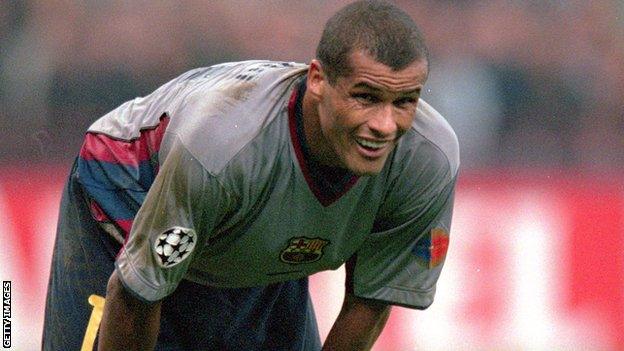
The Spanish media questioned Van Gaal's decision to leave out Rivaldo
In 1999 Van Gaal was in charge of Barcelona and Rivaldo was at the peak of his powers. The brilliant Brazilian inspired Van Gaal's side to their second consecutive La Liga title from out on the left wing, collecting the Fifa World Player of the Year award in the process.
Boudewijn Zenden, who was with Barca at the time, recently recalled what happened next: "Rivaldo thought he was better off playing behind the strikers, so when he won the Golden Ball he just said to Van Gaal: 'I don't want to play on the left anymore. I want to play behind the strikers.' Van Gaal said: 'Right. that's your decision' and he sat on the bench - because only the manager decided where he would play."
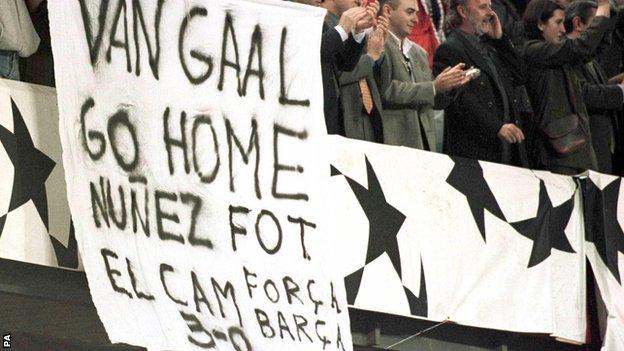
Barcelona supporters were glad to see the back of Van Gaal
Although he quickly got back into the team, Rivaldo only scored 12 league goals that season - down from 24 the previous campaign - and Van Gaal left after Barca failed to retain the La Liga title.
His departure was celebrated by the media, who had disapproved of his stance with Rivaldo and also disliked Van Gaal for his aggressive attitude towards them and failure to fully learn either Spanish or Catalan. Upon his departure, Van Gaal famously announced to the media: "Friends of the press, I am leaving. Congratulations."
Falling out with the world's most famous Dutchman. Continually...
The (many) times he has clashed with Johan Cruyff
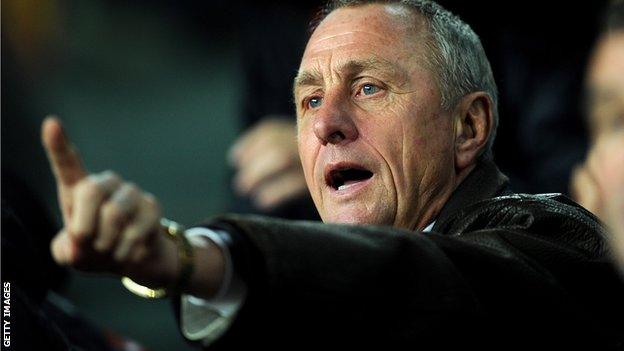
Cruyff went to court to prevent Van Gaal returning to Ajax
The Dutch nation can be divided in two halves in terms of their loyalties - pro-Cruyff and pro-Van Gaal. The two men have never got on. They are opposites: Cruyff, the world-class player who naturally became a manager. Van Gaal, the ordinary player with an academic background who became a world-class manager.
The annoying thing for Cruyff was that Van Gaal followed him to the two biggest loves of his life, Ajax and Barcelona, and was successful at both.
In his autobiography, Van Gaal alleges the feud began in 1989 when he hurriedly left a dinner at Cruyff's house without thanking his host for the meal after receiving a phone call informing him of the death of his sister - a claim rejected by Cruyff.
A decade later, Van Gaal felt that Cruyff undermined his managerial stint at the Nou Camp by repeated criticisms in the Catalan press, with Van Gaal bitterly noting: "I will never forgive what he did."
Their enmity simmered for years, not helped by Cruyff's observations that Van Gaal has "one or two screws loose in his head", but it reached new depths in 2011, when Cruyff took the extraordinary step of going to court to prevent Ajax from appointing Van Gaal as their new chief executive.
Cruyff was one of five members of Ajax's advisory panel and the only one who didn't want Van Gaal - so the other four went behind his back to appoint him anyway. Cruyff was furious, took the legal route and was eventually successful as the court ruled in his favour, overturning the appointment. Van Gaal said: "Of course it hurt. People forget that Ajax is also part of my life.''
Falling out with his captain
The time he showed Mark van Bommel the door
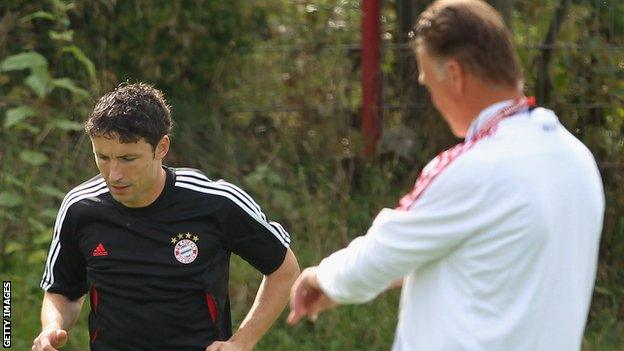
Van Bommel was eased out of Bayern Munich by Van Gaal despite being a successful and popular captain
When Van Gaal arrived at Bayern Munich in the summer of 2009, Mark van Bommel - his captain and compatriot - was one of the most important players as the club won the domestic double in Van Gaal's first season.
But in the winter break of the following season, Bayern bought Hoffenheim's 23-year-old Brazilian Luiz Gustavo for £13m. Gustavo was one of the rising Bundesliga midfielders... and 10 years van Bommel's junior.
Van Gaal told van Bommel in person he was no longer his captain, adding that his future competitors would also be Andreas Ottl, Anatoliy Timoschtschuk and Danijel Pranjic. Van Bommel was furious and Bayern watchers mystified. Nobody played the role of central defensive midfielder better than Van Bommel and the comparisons seemed insulting.
But Van Gaal wanted to make his team younger and to strengthen his position in the club by getting rid of one of their most important players. It was also said he feared that Van Bommel, who was good friends with Arjen Robben and Bastian Schweinsteiger, was becoming too powerful.
The German press saw it as an egocentric way of making it clear who was in charge, but Van Gaal was unrepentant, saying: "It is normal that the relationship crashes when a manager does not pick a certain player any more. A manager has the right to do it. Mark was very angry with me. But I did not decide whether he should leave or not."
By the end of that month Van Bommel had joined AC Milan.
Falling out with his playboy striker
When Luca Toni got an ear-bashing at the dinner table
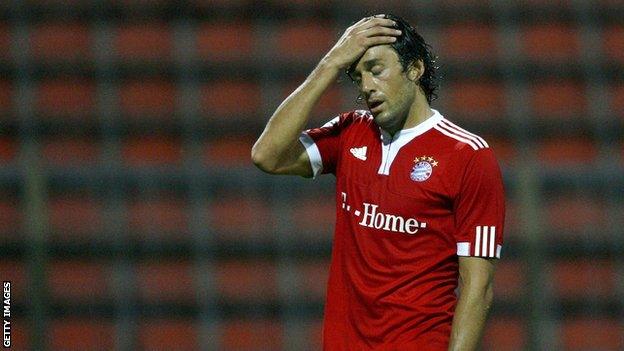
Luca Toni scored plenty of goals for Bayern - but Van Gaal didn't like his playboy image
The Italian international Luca Toni was a big hero at Bayern when Van Gaal arrived, having won the double playing alongside Franck Ribery under Ottmar Hitzfeld in his first season and scored 38 goals in 56 Bundesliga games across two campaigns. But from their first days together, Toni and Van Gaal had a terrible relationship.
In one training camp the Dutch coach was unhappy with Toni's manners when the team assembled for meetings and meals. One day Toni, a tall man, was slouching on his chair during dinner, as if he were watching TV on a sofa. Van Gaal went behind Toni's chair and pulled his ears to make him sit up straight.
For a proud Italian this was a humiliation. "The way Van Gaal treated the key players was unworthy on a human basis," Toni later reflected.
In September 2009, Van Gaal forced Toni to play two matches for FC Bayern II, their amateur team in Germany's third division, while he was recovering from an Achilles tendon injury. The match was watched by about 2,000 fans as the 2006 World Cup winner stumbled on the bumpy ground at the old stadium.
Van Gaal, though something of a showman himself, could not stand Toni's playboy image, with the Italian frequently portrayed as Bayern's "beau". The coach also felt Toni lacked discipline and fined the Italian in November 2009 when he left the stadium at half-time, having been substituted during a match against Schalke.
Falling out with the whole team
The time he dropped his pants
Van Gaal revelled in his reputation as fearlessly belligerent and at Bayern went to extreme lengths to prove it. "Van Gaal wanted to make clear to us that he can drop any player from the team," Luca Toni revealed later.
"It was all the same to him because, as he said, he had the balls. He demonstrated this literally by dropping his pants. I have never experienced anything like it, it was totally crazy. Luckily I didn't see a lot, because I wasn't in the front row."
Falling out with the club hierarchy
The time he insulted his Bayern bosses
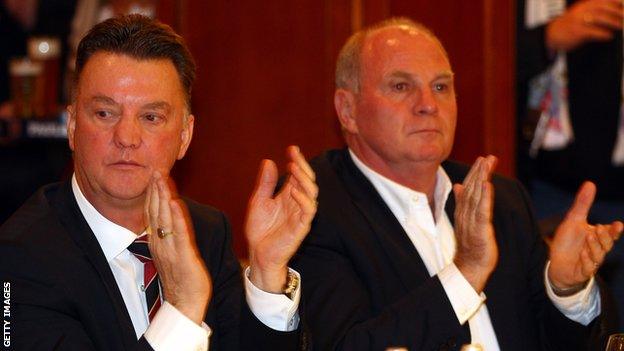
Ex-Bayern president Uli Hoeness wasn't impressed by Van Gaal's suggestion he could learn from reading his book
In October 2010 Van Gaal invited Karl-Heinz Rummenigge and Uli Hoeness, two senior members of the Bayern hierarchy, to the launch of his new book, Biographie & Vision, in a Munich hotel.
It should have been a convivial moment, especially as Hoeness had written the book's foreword. However, Bayern were experiencing their worst ever start to the season at the time and were 13 points from the top of the league, which made it all the stranger when the ever-confident Van Gaal gave them a copy, saying: "You can learn from it. It is important that you read it."
His bosses looked on angrily but not did say anything. Realising what had happened, he said afterwards: "Maybe I will get fined for it, but I don't think so." He did not get fined but many date the rift between him and the club to this moment and he was sacked six months later.
Falling out with Robin van Persie - then changing his mind
World Cup moments: Van Persie's spectacular header
The time the 'ultimate professional' won him round
Not all of Van Gaal's clashes have a bitter end. When he took over as Dutch coach for the second time after the team's disastrous performances at Euro 2012, the atmosphere among the Dutch players was so bad that the first thing Van Gaal did after his appointment was to bring them together in a luxurious hotel room in the village of Noordwijk on the Dutch coast, close to where he lives in a big penthouse.
He asked for their views on the 2012 Euro finals. Most gave theirs but Van Persie remained silent because, Van Gaal later discovered, he did not want to criticise anyone by speaking out.
"I saw that as a negative attitude," Van Gaal said, "so I declared that from that day on Klaas-Jan Huntelaar would be my number one striker and Robin had to accept a role on the bench.''
The first game of Van Gaal's second stint as coach was against Belgium, ironically the night Van Persie's transfer to Manchester United was confirmed. He stayed on the bench for the whole 90 minutes, but did not complain.
When asked if he regretted Van Gaal's appointment, the forward said: "Not at all. From what I have seen in the first few days, he has all the qualities of a fabulous manager. I say that despite the fact he has put me on the bench.''
I would love Man Utd job - Van Gaal
Van Gaal, who had expected Van Persie to react negatively, was amazed by the "professional attitude and spirit" of his striker. "I had to admit later that I really did not know the person behind the player, Van Persie in 2012. I knew certain players shared my football philosophy. About Robin I knew nothing.
"I had to get to know him. But when I did, I soon realised he was an amazing professional. He was the ultimate pro. And also important for me was that he was very social towards the other players in the squad.
"He showed leadership - and this is why 10 months later I made him captain of the Dutch team. He deserved that. He completely shares my vision on football.''
Additional reporting from Andy West, Patrick Strasser and Marcel van der Kraan.
- Published17 July 2014
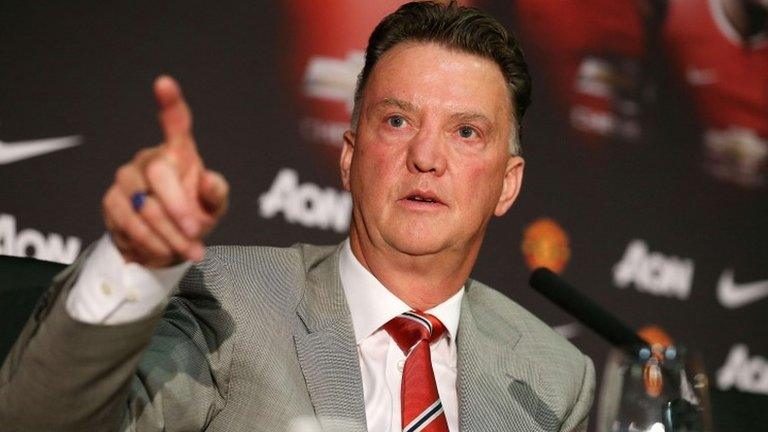
- Published17 July 2014
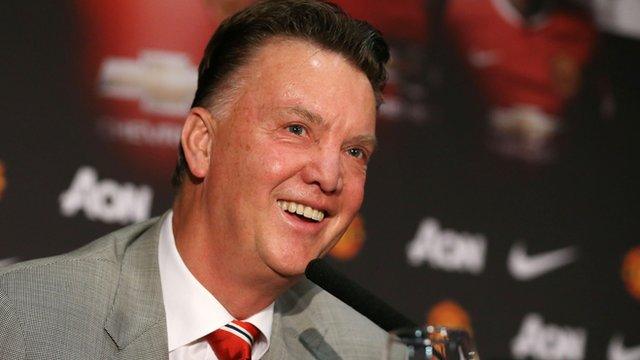
- Published17 July 2014
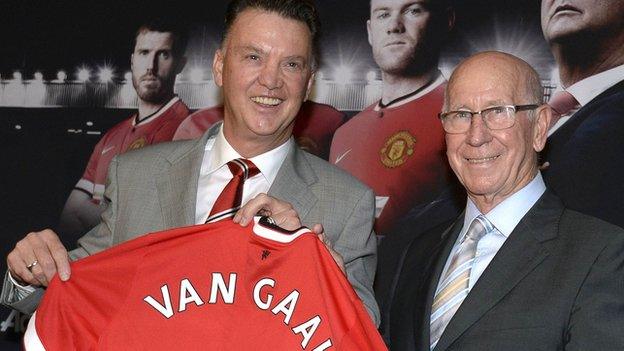
- Published20 May 2014
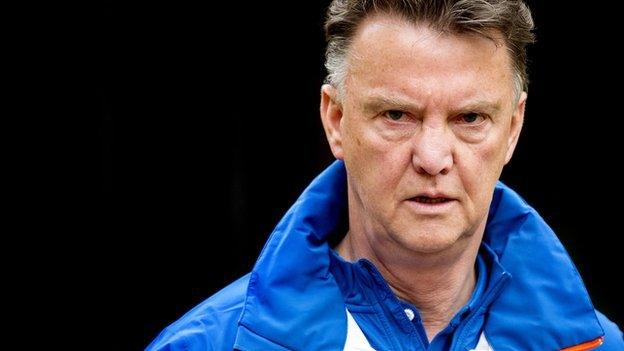
- Published23 April 2014
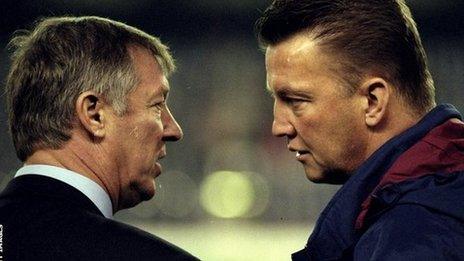
- Published19 May 2014
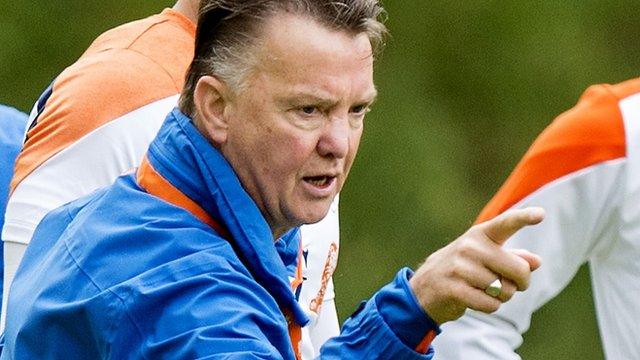
- Published7 June 2019
